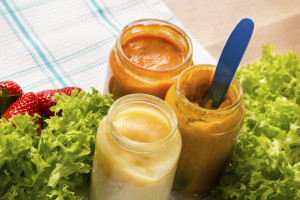
Great, Healthy Home-Made Foods to Start Your Baby on Solids
The recent news report about a small piece of glass having been found in a jar of Beech-Nut baby food is enough to send chills down a new mom’s spine.
What if you want to be sure about the quality control in the food you’ll feed your 6-month-old when that time comes? What if you want to prepare your own baby foods?
There is no rule anywhere that says you have to rely on store-bought baby foods, or that these foods are somehow better than those you could fix for your baby at home. Starter foods are easier to whip up than you might think. You just have to follow a few simple rules.
The first is to wait until your infant is at least 6 months before you introduce solids. While until recently, pediatricians used to tell moms to start babies on solid foods between 4 and 6 months of age, the new recommendation by the American Academy of Pediatrics is that babies consume nothing but breast milk (or formula, or both) for the first six months of their lives. This is now believed to help prevent food allergies later. It will also allow your little one’s digestive tract to mature more, so that solids will be better tolerated, lowering risk of constipation or gassiness.
That said, in a few cases, a baby’s doctor may decide that it’s best to start him or her on solids earlier than at 6 months, such as when an infant is not thriving, not putting on weight at a healthy pace, or was born prematurely or had a low birth weight. This is a matter for each parent to decide in consultation with their pediatrician.
If you and your doctor have determined that your baby is ready for solids, the next thing to keep in mind is that starter foods need to be smooth in consistency — no lumps or chunks that could pose choking hazards. That leaves out such foods as grapes, raisins or any softer fruits or vegetables that haven’t been properly mashed.
Another rule to follow in the beginning is to give your baby only one new food at a time, for four days, before moving on to another food. That will make it easy for you to spot any foods that don’t agree with your baby’s system, so that you can avoid them.
A study published recently found that infants who are fed solid foods while still being breastfed were better able to tolerate the solids and not get food allergies, compared to those who started on solids after they stopped drinking breast milk. Your breast milk has countless protective factors uniquely beneficial for your baby, which develop and strengthen his or her immunity; so, it makes sense that it would protect against undesired immune system reactions such as allergies to the foods eaten.
A final point to keep in mind is that once your baby starts eating solids, they will drink less milk; if you’re exclusively breastfeeding, that may mean that your milk supply will decrease.
Great Solid Foods to Start Your Baby on
You can make your own rice cereal (we recommend brown rice, as it’s more nutritious than white, though white will work, also) by grinding about a quarter cup of rice in a blender or food processor. Bring 1 cup (or less) of water to a boil, add rice and stir; cook in low heat for 10 minutes, stirring periodically. Mix about a spoonful of the paste with 3-4 spoonfuls of breast milk or formula. Sure, a little work — but you’ll save a lot of money over store-bought baby cereals.
You can keep the ground rice in a canister, so it’ll be ready to cook when you need it. You can also refrigerate unused portions of the cooked paste in a sealed container; rice doesn’t spoil fast, so, it will be good in the refrigerator and ready to reheat for a number of days.
Once you introduce your baby to fruits, you can add a little pureed fruit, to liven up the rice.
Which brings us to fruits and vegetables. Some fruits and veggies can be given to your baby without any preparation. Two of our favorites are bananas and avocados. Both wonderfully nutritious and you can mash a small section (about a spoon’s worth) in a couple of seconds. Leave seed in any unused portion of an avocado, store in a container and refrigerate; if seed is removed, it browns quickly.
Other great first foods are apples, pears, sweet potatoes and carrots. Apples, pears and carrots can be chopped into pieces and boiled in a little water for about 5 minutes, until tender. Use just a couple of tablespoonful’s of water per ounce of fruit and boil in low heat until water evaporates; that way, it’s more of a steaming than a boiling, and you preserve nutrients while still killing bacteria. Then, mash with a potato masher.
Sweet potatoes are great baked, which also brings out their natural sweetness. Bake in 375 deg. Fahrenheit oven for about an hour. No mashing needed, simply scoop fruit out of the peel. Sweet potatoes are another highly nutritious and delicious produce that your entire family can enjoy!
By Lisa Pecos